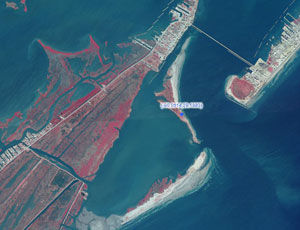For the most part, contractors have not yet been engaged in cleanup or remediation efforts to combat the flow of oil encroaching on the Gulf Coast.

HNTB Corporation, Kansas City, Mo. has contracts in place with both the State of Louisiana Office of Coastal Protection and Restoration and with the U.S. Army Corps of Engineers, New Orleans District, that would allow either the state or the Corps to hire HNTB immediately. However, HNTB is currently engaged only in uncompensated, support activities.
Contractors are ready to go to work. However, it’s the off-the-record, general consensus in the construction industry that British Petroleum, for the most part, is concentrating on employing commercial fishermen to deploy oil containment booms.
Even some contractors already performing coastal restoration and hurricane protection work for the Corps say they haven’t been hired for cleanup work yet.
As evidence, the Corps’ NOD had only issued three permits for oil spill-related work by May 10, says Pete Serio, regulatory chief in charge of permitting. The permits were issued in response to the Louisiana Dept. of Wildlife and Fisheries request to fill two breaches on Elmer’s Island to prevent the advancing oil spill from entering the inside bay.
“Due to the advancing oil slick, we are concerned about the effect on the wildlife refuge should the oil penetrate the island,” says Christy Lavergne McDonough, biologist supervisor, aquatic habitat program, for the state wildlife and fisheries department. “We have equipment and materials on stand-by, ready to work as soon as authorization is given.”
The breaches were originally created during Hurricanes Gustav and Ike, and have since expanded, McDonough says. The LDWF proposes using sand and concrete bags to seal the breaches.
A permit was also issued to the Greater Lafourche Port to seal gaps near the port. The Louisiana National Guard requested a permit to build a loading pier at Campo’s Marina near the Mississippi River Gulf Outlet at Shell Beach to load oil booms.
Meanwhile, the Obama administration sent to Congress an outline of what it would like to see in legislation to strengthen the response to the spill and recovery efforts.
White House officials told reporters that the approximately $118-million package was needed to strengthen and update existing laws relating to oil spills. They added that the administration would be “relentless” in seeking compensation to pay for the legislative package from the parties responsible for the spill.
Carol Browner, assistant to the president for energy and climate change, said laws relating to the liability of polluters badly need updating. The Oil Pollution Act, for example, was passed 20 years ago when offshore exploration and production in deepwater represented a small portion of the nation’s energy supply, Browner said.
The package would increase the cap on damages and claims from $500 million to $750 million and increase the ceiling on the amount of money that can be expended on recovery per incident from the Oil Spill Liability Trust Fund from $1 billion to $1.5 billion. The legislation also calls for raising the caps on liability for responsible parties, although it does not specify an amount.
In congressional testimony May 11, BP America CEO Lamar McKay said BP would assume responsibility for all “legitimate” expenses. “Our obligation is to deal with the spill, clean it up and make sure the impact of that spill are compensated, and we are going to do that,” he said.
The current cap for responsible parties is $75 million. Sen. Robert Menendez (D-N.J.), along with Sens. Frank Lautenberg (D-N.J.) and Bill Nelson (D-Fla.) introduced legislation on May 3 that would raise the cap on oil company liability to $10 billion.
White House officials say they plan to “work with lawmakers” to set an appropriate ceiling for individual company liability.



Post a comment to this article
Report Abusive Comment